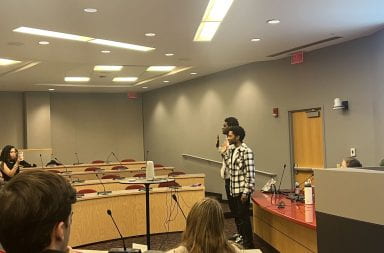The length of a football field.
That’s what separated Taylor Landes from the finish line of the Boston Marathon Monday when she heard an explosion.
“I was about 100 yards away and was actually looking the other way and heard a big boom, which sounded like someone released a cannon, fired off a cannon,” said Landes, a third-year in international studies at Ohio State and a Boston native. “I turned and saw a cloud of smoke.”
The explosion was the first of two blasts that the Boston Police Department has determined to be bombs that left at least three dead, including an 8-year-old boy, and at least 141 injured as of 10 p.m. Monday, according to the Boston Globe.
Landes said the second explosion was closer to where she was standing with her family, who attends the race together as a tradition and was supporting a family friend who ran.
“About 10 seconds after the first explosion, two blocks closer to us … there was a blast with fire and a big cloud of smoke,” Landes said. “It smelled like fireworks. My brother-in-law who is a former Marine said, ‘That’s what a bomb smells like.'”
Landes said she and her family had “not confirmed where (their family friend) is,” as of about 4:30 p.m. Monday.
The series of blasts erupted at about 2:50 p.m., or nearly six hours after the start of the race. The first wave of marathon runners had a start time of 9 a.m. Monday.
President Barack Obama addressed the nation Monday evening about the explosions.
“All Americans stand with the people of Boston,” Obama said. “Boston police, firefighters and first responders, as well as the national guard responded heroically and continue to do so as we speak.”
He emphasized the importance of focusing on the facts.
“We still do not know who did this or why and people shouldn’t jump to conclusions before we have all the facts,” Obama said. “But, make no mistake, we will get to the bottom of this and we will find out who did this. We will find out why they did this. Any responsible individuals, any responsible groups will feel the full weight of justice.”
According to the Boston Globe, a person of interest was being questioned at about 8 p.m. Monday.
The Boston Athletic Association, which puts on the marathon, also released a statement following the explosions.
“Today is a sad day for the city of Boston, for the running community, and for all those who were here to enjoy the 117th running of the Boston Marathon,” the statement read. “What was intended to be a day of joy and celebration quickly became a day in which running a marathon was of little importance.”
Paula Song, assistant professor in OSU’s College of Public Health, ran in the race. She said she finished about 30 minutes before the explosions.
“We heard the explosions, we weren’t exactly sure what happened but we knew it wasn’t right,” Song said in an email. “People were very shaken and crying and we knew it was a bomb. We didn’t know the full details until we got back to the hotel. Ambulances and first responders were on the scene within minutes. It is all very horrible.”
A third explosion at John F. Kennedy Library, about a 15-minute drive from the marathon explosions, occurred more than an hour after the two explosions near the finish line. The JFK Library explosion, however, appears to have been fire-related and not related to the two earlier explosions, according to Boston Police. There were no injuries reported at the third explosion.
Two additional explosive devices were found and dismantled, according to the Associated Press.
Mike Dibartola, a fourth-year OSU medical student, and his younger brother, Alex Dibartola, a first-year OSU medical graduate student, both ran in the marathon, but were back at their hotel by the time the explosions occurred.
“It sounds like the explosion went off around 2:50 (p.m.). My brother and I finished in just a little over three and a half hours at about 1:35 (p.m.) or so. So we missed it by a little over an hour thankfully,” Mike Dibartola said.
He said he will be thinking twice about running in an event like this again.
“It does (make me feel frightened to run an event like this again) especially in a big city like this,” Mike Dibartola said. “I don’t know what this was and what all the details are and if it was a terrorist attack, I mean, that’s what those people want. You don’t want them to win, you know? So I’m sure that security at events like this will be heightened … It’ll definitely make me think twice about it, that’s for sure.”
The Dibartolas were on the way to the airport to return to Columbus Monday at about 4:30 p.m., and Mike Dibartola said they were nervous.
“We’re about to go to the airport and that’s not a place you look forward to going after something like this,” he said.
Alex Dibartola said the scene at the airport was “chaotic” and their flight was delayed.
“There are also state troopers with automatic riffles patrolling and bomb sniffing dogs as well. Ironically, it makes me feel more safe,” Alex Dibartola said in an email.
Public transportation in Boston was shut down due to the explosions.
This year about 26,839 runners were entered in the race. There were 55 registered runners listed as hailing from Columbus, and 680 from Ohio.
The first Boston Marathon was held in the spring of 1897. The race has grown from 4,904 entrants in 1986, according to the Boston Athletic Association’s website.
Patrick Maks, Ben Keith and Halie Williams contributed to this story.


